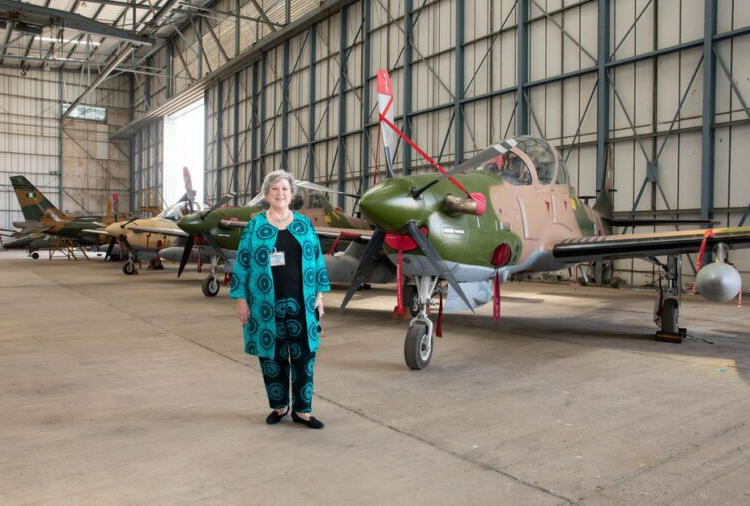The US Air Force has finished constructing support facilities for the Nigerian Air Force’s A-29 Super Tucano’s at Kainji Air Base.
The Nigerian Air Force commissioned the operations support facilities and winged 6 additional pilots on the A-29 Super Tucano (A-29ST) aircraft.
The spaces include storage areas, munition assembly sections, an A-29 flight simulation annex, and sunshades to house the light attack aircraft.
The $38 million project began last year and serves as US Air Force Security Assistance and Cooperation’s (AFSAC) first major construction work in sub-Saharan Africa.
It is part of a $500 million foreign military sale package approved in 2018 to deliver 12 A-29s, associated training, and long-term sustainment to the Nigerian Air Force.
The contract for the production of the aircraft was awarded to Sierra Nevada Corporation in 2018. The contract comprised supply of 12 aircraft and infrastructure and facility upgrade to support the aircraft operation. The first phase of the contract has since been completed with the delivery of the entire aircraft, while yesterday infrastructure handover and commissioning ceremony marked the completion of the second phase.
“This ceremony marks the end of the construction process and the turnover of new facilities to the Nigerian Air Force for its use,” AFSAC Director Brig. Gen. Joel Safranek stated.
“The A-29 provides light attack, intelligence, surveillance and reconnaissance capabilities needed to confront security threats and the newly constructed facilities provide the support needed to keep the aircraft operational and effective.”
“The United States looks forward to a long-term, enduring relationship with Nigeria.”
According to the US Air Force, Nigeria’s Super Tucano fleet and its corresponding support facilities will contribute to enhancing the country’s defense operability.
The base improvements were delivered in two main phases, with the first phase completed in 2021 to allow for the safe delivery of the first A-29 aircraft, which now play a key role in Nigerian Air Force operations to combat violent extremist organizations, such as ISIS-West Africa and Boko Haram.
Some of the major construction upgrades include the creation of a munition storage area with earth covered magazines for secure storage capability. The area also includes a munitions maintenance and assembly facility, new taxiway, and hot cargo pad.
“The facilities and the aircraft will provide the Nigerian Air Force an advantage as they support their country’s national security,” AFSAC Program Manager David Snook said.
In late 2020, the United States Air Force began constructing the facilities needed to support Nigeria’s new A-29 Super Tucano air wing.
To support A-29 operations, a new facility with mission planning and debriefing rooms and a Battle Aviation Training Device, was constructed.
The team also modernized an existing hangar, adding more electrical capability to maintain the aircraft and renovating the tire shop and battery room. In addition, 12 sunshades were installed to provide sun protection for maintenance crews and the aircraft when they are not in a hangar.
The US Army Corps of Engineers, Europe District, which is part of the larger US Army Corps of Engineers, North Atlantic Division, oversaw the construction of these projects, which are key to facilitating the operation and maintenance of the 12 Super Tucanos and their accompanying munitions.
Two years ago, the United States Army Corps of Engineers (USAGE) recently established a permanent presence in Africa to oversee key U.S. Africa Command (AFRICOM) projects.
The move to establish a permanent presence is an important step as the mission’s support and partnership with the Nigerian military grows and includes AFRICOM’s work to promote regional security, stability and prosperity.
Now with the consolidation of U.S. Army Europe and U.S. Army Africa into one command, the placement of a Europe District employee in Africa is more important than ever.
The construction project also significantly increased security infrastructure with the installation of miles of fencing, and improvements to base entry control points, US Air Force Material Command said.
“The A-29 is important, not only to the region, but also our collective security posture to address challenges around the world,” A-29 Nigeria Foreign Military Sales Program Manager Valerie Halvorsen added.
The construction project also significantly increased security infrastructure with the installation of miles of fencing, and improvements to base entry control points, US Air Force Material Command said.
Crews are now finishing the second and final phase of air base improvement projects, which include improved base security, munitions storage and maintenance, aircraft hangars and aprons, and training facilities to ensure the continued successful operations of the new fighter wing.
The project consists of a $36.1 million contract for facilities to support a dozen A-29 aircraft. The work involves the construction of a new airfield hot cargo pad, perimeter and security fencing, munitions assembly and storage, small arms storage, a flight annex wing building for simulator training, airfield lights, and various airfield apron, parking, hangar and entry control point enhancements.
The contract for the construction was awarded by the US Air Force Security Assistance and Cooperation Directorate’s Foreign Military Sales Construction Division to the United States Army Corps of Engineers, Europe District.
In September, an American company Relyant Global was also contracted by the U.S. Army to quickly upgrade the future home of the Super Tucano A-29 combat aircraft in Kainji airbase



